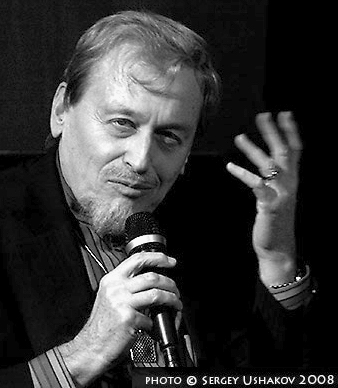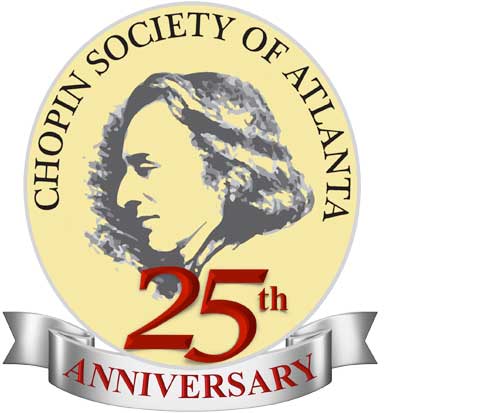Adam Makowicz
- talks about Chopin, classical music and jazz before his concert with Piotr Folkert in Atlanta*
Interview by Bożena U. Zaremba
You are a renowned jazz pianist, but at your concerts you often play classical music. Why this liaison?
I was classically trained - I attended musical schools at the end of the ‘50s and the beginning of the ‘60s. There were no jazz schools or jazz classes at that time in Poland. Jazz was still considered decadent and unwanted, though no longer forbidden as it had been during the Stalin regime,
when you could be jailed for playing jazz. So the only education musicians could get was in classical music. After having played only jazz for so many years, I still love listening to classical music. It is very inspiring and helps me in my improvisations to go beyond typical ways of expression.
Gershwin was the first one who managed to combine classical music with jazz when he wrote Rhapsody in Blue and Concerto in F (which I have in my repertoire). Then Bernstein continued this tradition, as well as Copland and other American composers.
Classical music is based in Europe, while jazz came from Africa, Cuba and Brazil, then other parts of the world. Latin music influenced American music as well, to form this unique form of music. But I never liked to limit myself to one convention, and classical music opens great possibilities
and gives me incredible tools. Another reason for playing classical music is to have a chance to cooperate with great classical musicians and orchestras.
How did your classical training influence your jazz career?
It gave me the necessary foundations and the technique. Whether it is classical music or jazz, the bases are the same, the tools are the same.
When did you know jazz was the music you would like to devote your life to?
I discovered jazz when I was about sixteen. I listened to "Music USA-Jazz Hour," a radio program broadcast on the Voice of America every night and produced and hosted by Willis Conover. I gained basic knowledge about jazz from him; later he became my close friend. There were a few jazz pianists like Art Tatum and Erroll Garner who had a tremendous influence on my almost overnight decision to play jazz. I was brought up in a completely different culture, and the rhythm, the swing so inherent in this music was so fascinating that I knew right away this was the direction I was going to take.
In 2000 you released a CD, “Reflections on Chopin,” and last year you played Chopin with Leszek Możdżer at Carnegie Hall; here in Atlanta we will have a chance to listen to your improvisations on Chopin. Why such an interest in this composer?
The Carnegie Hall concert was created and organized by the director of the Polish Cultural Institute in New York, Mr. Paweł Potoroczyn. The CD from this concert has already gone double platinum in Poland, which is quite unusual for jazz music. And why Chopin? We are both Polish, I live here in America, Leszek Możdżer in Poland, and Chopin is our national composer. So two Poles playing in New York, at the most prestigious concert hall—we had to play Chopin. Chopin is also one of the best-known composers in the world; there is something in his music that is so appealing to people everywhere. The dialogue with the audience is easier if you play something they already know well.
Which elements of Chopin’s music appeal to a jazz musician most?
Mainly the melody. Whether it is a ballade, nocturne, etude or prelude, they all have beautiful melodies, and each and every one of Chopin’s melodies is great for improvising. It is really incredible that something written so many years ago can fit every genre or style so smoothly. One of the first examples of Chopin’s melody used for this purpose (though not a direct quote) was a bossa nova, “How Insensitive,” based on Prelude E minor and written by the Brazilian composer Antonio Carlos Jobim. It’s incredible how this melody fits this genre so well - the melody and the harmony are the same but suddenly we get a beautiful bossa nova.
Let’s talk about improvisation. It has been known in music for ages, but it is different in classical music and jazz.
Right. Chopin or Liszt did improvise; there were even improvisation contests at that time. Chopin, for example, would get in touch with his publisher and ask if he could still change something in the manuscript because he liked the way he played the piece the night before better than what he had written in the manuscript. So his music often comprises improvisations that have been simply written down; his preludes or sonatas consist of a few main motifs, and then we hear different variations of the theme. Those variations are very unique: specific for Chopin, for the way he felt the music. When I play his music I only take fragments, the melody (because you cannot improvise on improvisations), which I transform in my own way and add the element of swing. Classical music does not have that swing, which is the most important element of jazz.
Can you describe the creative process of improvisation?
It’s a very long and subtle process, which can be compared to the work of a writer working on a novel. You need to learn how to work with the words, then with sentences, and how to make them comprehensible, how to build tension and make it all interesting for the reader. The same in music – you need to find the way to play a phrase so it will touch the listener’s soul, so it will move him/her to a different world of sound, world of beauty. You definitely need musical knowledge to do that, but improvisation is an individual creative process, and every musician plays differently. Every jazz musician searches for his or her unique mode of expression and learns to build musical phrases so that music will reach and influence the audience.
What about spontaneity? Is there a place for that during the concert?
Yes, of course, but the improvisation does not come out of the blue. It does have to have some sense and be consistent. The whole thing is based on contact with the audience. A good improviser can communicate with the listeners. The language he is using has to be concise and has to tell a story that will appeal to people.
What role does intuition play in all of this?
A great deal. Improvisation is after all played on the spot, but you need a blueprint; you need to have plan. The rest depends on a lot of different elements—on the audience and their responsiveness, on the acoustics in the concert hall and on the instrument. These things decide whether the concert will throw the audience on their knees or will be just a good one.
How does a “classical” audience respond to jazz improvisations on Chopin’s music?
They find it very interesting, this combination of classical music and jazz. The audience in Atlanta will have a chance to compare the two genres and to experience how Chopin’s music can evoke different feelings and emotions.
Is your concert with Piotr Folkert in Atlanta the first time you will play with a classical pianist in such a format?
No, I have played many concerts with classical pianists - here in New York, for example, with Roman Markowicz, who is also a great music critic, and with Jacek Zganiacz, and also in Poland with Krzysztof Jabłoński. I also played a combined concert—that is, classical and jazz—with the young, talented pianist and composer Stanisław Drzewiecki; we both improvised on his compositions. The response from the audience was always enthusiastic, and they asked for more.
Tell us something about the format of the concert in Atlanta.
Piotr Folkert, who is a purely classical pianist, will play the classical version of Chopin’s music, and I will improvise on the same piece. We will try to communicate with the audience with the two different genres, and finding this contact with the listeners, both classical lovers and jazz fans, will be fascinating.
What pieces are you planning to play?
Mainly short pieces: preludes, nocturnes, mazurkas and ballads, but we will decide on the details when I come to Atlanta.
Is this your first visit to Atlanta?
Yes, and I am really looking forward to what will surely be a great experience.
Thank you very much for the interview.
*May 14, 2005 7:30 pm
St. James United Methodist Church
4400 Peachtree Dunwoody Road, Atlanta, GA 30342
The artist’s biography







